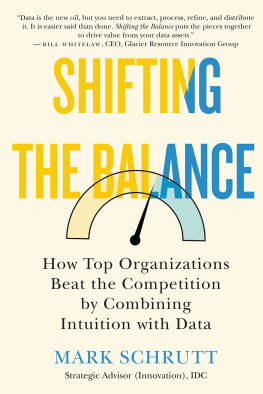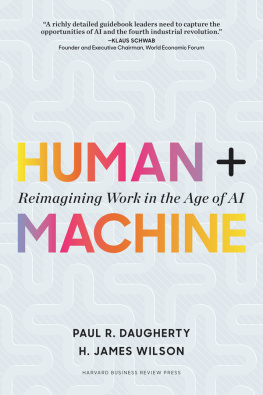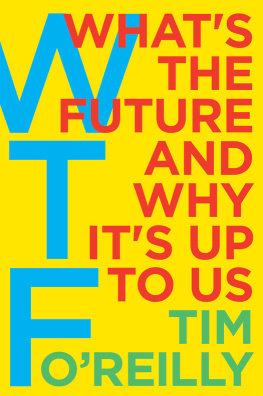Thank you for buying this ebook, published by HachetteDigital.
To receive special offers, bonus content, and news about ourlatest ebooks and apps, sign up for our newsletters.
Copyright 2017 by Christian Madsbjerg
Jacket design by Pete Garceau
Cover copyright 2017 by Hachette Book Group, Inc.
Hachette Book Group supports the right to free expression and the value of copyright. The purpose of copyright is to encourage writers and artists to produce the creative works that enrich our culture.
The scanning, uploading, and distribution of this book without permission is a theft of the authors intellectual property. If you would like permission to use material from the book (other than for review purposes), please contact permissions@hbgusa.com. Thank you for your support of the authors rights.
Hachette Books
Hachette Book Group
1290 Avenue of the Americas
New York, NY 10104
hachettebooks.com
twitter.com/hachettebooks
First Edition: March 2017
Hachette Books is a division of Hachette Book Group, Inc.
The Hachette Books name and logo are trademarks of Hachette Book Group, Inc.
The publisher is not responsible for websites (or their content) that are not owned by the publisher.
The Hachette Speakers Bureau provides a wide range of authors for speaking events. To find out more, go to www.hachettespeakersbureau.com or call (866) 376-6591.
Library of Congress Cataloging-in-Publication Data has been applied for.
ISBNs: 978-0-316-39324-9 (hardcover), 978-0-316-39323-2 (ebook)
E3-20180703-JV-PC
1.
A senior executive at one of the worlds largest health care technology companies sits in a conference room filled with whiteboards. PowerPoint slides blink by on a projector screen. After growing in the double digits for almost a decade and securing a comfortable lead in the market for diabetes care products, the EVPs department has missed its sales targets for the third time this year. A few months ago, he signed off on an extensive round of market research to understand why. The marketers conducted surveys with thousands of diabetes patients all over the United States and Europe, measuring hundreds of different factors that account for their compliance in taking their medication. He learned that 43 percent of Type 2 diabetes patients are noncompliant, and 84 percent of those noncompliant patients cite forgetfulness as the main reason for their noncompliance. With only a short period of time to turn the company around before the board tears into him, the EVP is consumed with anger. We already know that patients are noncompliant because they forget. Weve known that for decades. We need to know what we can do to get them to change their behavior. The room is silent. After millions of dollars and months of research, no one in the room has any idea why people do what they do.
2.
A candidate for Senate in a battleground state reviews the polling averages for her race. Her consultants tell her that the averages, when properly adjusted to reflect the current environment, assure her a win in November. They have sliced her electorate into ever-narrowing segments so she can shape her talking points accordingly. Weve seen this before, they say. This November will be like the last election and the one before. But over the spring, something completely unexpected happens. A surprising new candidate puts his hat in the ring. Instead of talking points and segmentation, he captures the imagination of the electorate with an oratorical gift, weaving together seemingly disparate cultural themes and patterns into a powerful metaphor for the future. When the frontrunner watches a video of one of his rallies, she can see the swell of energy and excitement in the voters. The mood of the event fills her with a deep sense of foreboding. With all the numbers showing support for her campaign, why does it feel as though this man is making a more meaningful connection with the voters than she? In a moment of terror, it dawns on her that she is going to lose this election despite doing everything exactly right.
3.
An entrepreneur at a start-up specializing in solar power solutions struggles to make sense of changes in the market. As energy distribution moves from a centralized modelprovided by utilities over the gridto an increasingly distributed model with a constellation of players, the entrepreneur must synthesize a variety of different data streams. Her team prides itself on its engineering expertisecutting-edge technical knowledge of the solar marketso they spend little time dealing with all of the cultural and political dynamics that occur within corporate sustainability initiatives. And yet, despite their industry knowledge, her company is losing clients. Just today, one of their biggest corporate clients, a retail chain eager to use sustainability initiatives in their marketing platforms, announced that they were signing on with another solar company selling products technically inferior and more expensive than the product she is offering. She must find partners to replace them immediately or she wont make company payroll in a month or two. Why are we losing market share to competitors with far less technical knowledge? she thinks. What are we missing?

Although the word algorithm is in the subtitle, this is not really a book about algorithms. Nor is this a book about computer programming or the future of machine learning. This is a book about people. More specifically, this is a book about culture and the pendulum shifts of our age. Today we are so focused on STEM-based knowledgetheories from science, technology, engineering and math, and the abstractions of big datathat alternative frameworks for explaining reality have been rendered close to obsolete. This pendulum shift is doing great damage to our businesses, governments, and institutions. As each of these three scenarios illustrates, society devalues our human inferences and judgments at a great cost. Our fixation with STEM erodes our sensitivity to the nonlinear shifts that occur in all human behavior and dulls our natural ability to extract meaning from qualitative information. We stop seeing numbers and models as a representation of the world and we start seeing them as the truththe only truth. We are in grave danger of completely eroding our sense of the human world in favor of these false abstractions.
Of course, the hard sciences are a good way of explaining quite a lot on our planet, namely material nature. They are tremendously effective at explaining chemistry, engineering, or physics, for example. But they are not good at explaining us. As the famed physicist Neil deGrasse Tyson put it, In science, when human behavior enters the equation, things go nonlinear. Thats why physics is easy and sociology is hard.
Because, at the end of the day, it doesnt matter how much hard data we have in our hands, how many brain scans weve monitored on our screens, or how many different ways we have segmented our markets. If we dont have a perspective on the human behavior involved, our insights have no power. When we lose touch with the human circumstances present inside every single election, behind every breakout innovation and each and every successful corporate initiative, we limit our ability to genuinely understand our world.








